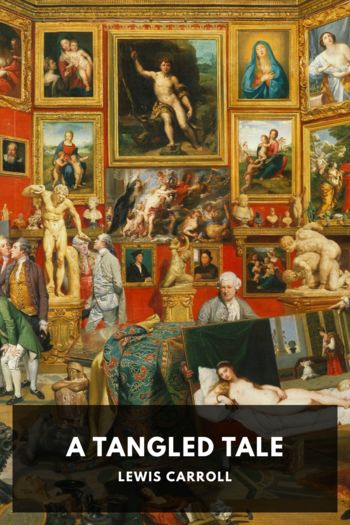A Tangled Tale, Lewis Carroll [free ebook novel .txt] 📗

- Author: Lewis Carroll
Book online «A Tangled Tale, Lewis Carroll [free ebook novel .txt] 📗». Author Lewis Carroll
Of those who win honours, The Shetland Snark must have the 3rd class all to himself. He has only answered half the question, viz. the amount of Clara’s luncheon: the two little old ladies he pitilessly leaves in the midst of their “difficulty.” I beg to assure him (with thanks for his friendly remarks) that entrance-fees and subscriptions are things unknown in that most economical of clubs, “The Knot-Untiers.”
The authors of the 26 “accidental” solutions differ only in the number of steps they have taken between the data and the answers. In order to do them full justice I have arranged the 2nd class in sections, according to the number of steps. The two Kings are fearfully deliberate! I suppose walking quick, or taking shortcuts, is inconsistent with kingly dignity: but really, in reading Theseus’ solution, one almost fancied he was “marking time,” and making no advance at all! The other King will, I hope, pardon me for having altered “Coal” into “Cole.” King Coilus, or Coil, seems to have reigned soon after Arthur’s time. Henry of Huntingdon identifies him with the King Coël who first built walls round Colchester, which was named after him. In the Chronicle of Robert of Gloucester we read:—
“Aftur Kyng Aruirag, of wam we habbeth y told,
Marius ys sone was kyng, quoynte mon & bold.
And ys sone was aftur hym, Coil was ys name,
Bothe it were quoynte men, & of noble fame.”
Balbus lays it down as a general principle that “in order to ascertain the cost of any one luncheon, it must come to the same amount upon two different assumptions.” (Query. Should not “it” be “we”? Otherwise the luncheon is represented as wishing to ascertain its own cost!) He then makes two assumptions—one, that sandwiches cost nothing; the other, that biscuits cost nothing, (either arrangement would lead to the shop being inconveniently crowded!)—and brings out the unknown luncheons as 8d. and 19d., on each assumption. He then concludes that this agreement of results “shows that the answers are correct.” Now I propose to disprove his general law by simply giving one instance of its failing. One instance is quite enough. In logical language, in order to disprove a “universal affirmative,” it is enough to prove its contradictory, which is a “particular negative.” (I must pause for a digression on Logic, and especially on Ladies’ Logic. The universal affirmative “everybody says he’s a duck” is crushed instantly by proving the particular negative “Peter says he’s a goose,” which is equivalent to “Peter does not say he’s a duck.” And the universal negative “nobody calls on her” is well met by the particular affirmative “I called yesterday.” In short, either of two contradictories disproves the other: and the moral is that, since a particular proposition is much more easily proved than a universal one, it is the wisest course, in arguing with a Lady, to limit one’s own assertions to “particulars,” and leave her to prove the “universal” contradictory, if she can. You will thus generally secure a logical victory: a practical victory is not to be hoped for, since she can always fall back upon the crushing remark “that has nothing to do with it!”—a move for which Man has not yet discovered any satisfactory answer. Now let us return to Balbus.) Here is my “particular negative,” on which to test his rule. Suppose the two recorded luncheons to have been “2 buns, one queen-cake, 2 sausage-rolls, and a bottle of Zoëdone: total, one-and-ninepence,” and “one bun, 2 queen-cakes, a sausage-roll, and a bottle of Zoëdone: total, one-and-fourpence.” And suppose Clara’s unknown luncheon to have been “3 buns, one queen-cake, one sausage-roll, and 2 bottles of Zoëdone:” while the two little sisters had been indulging in “8 buns, 4 queen-cakes, 2 sausage-rolls, and 6 bottles of Zoëdone.” (Poor souls, how thirsty they must have been!) If Balbus will kindly try this by his principle of “two assumptions,” first assuming that a bun is 1d. and a queen-cake 2d., and then that a bun is 3d. and a queen-cake 3d., he will bring out the





Comments (0)